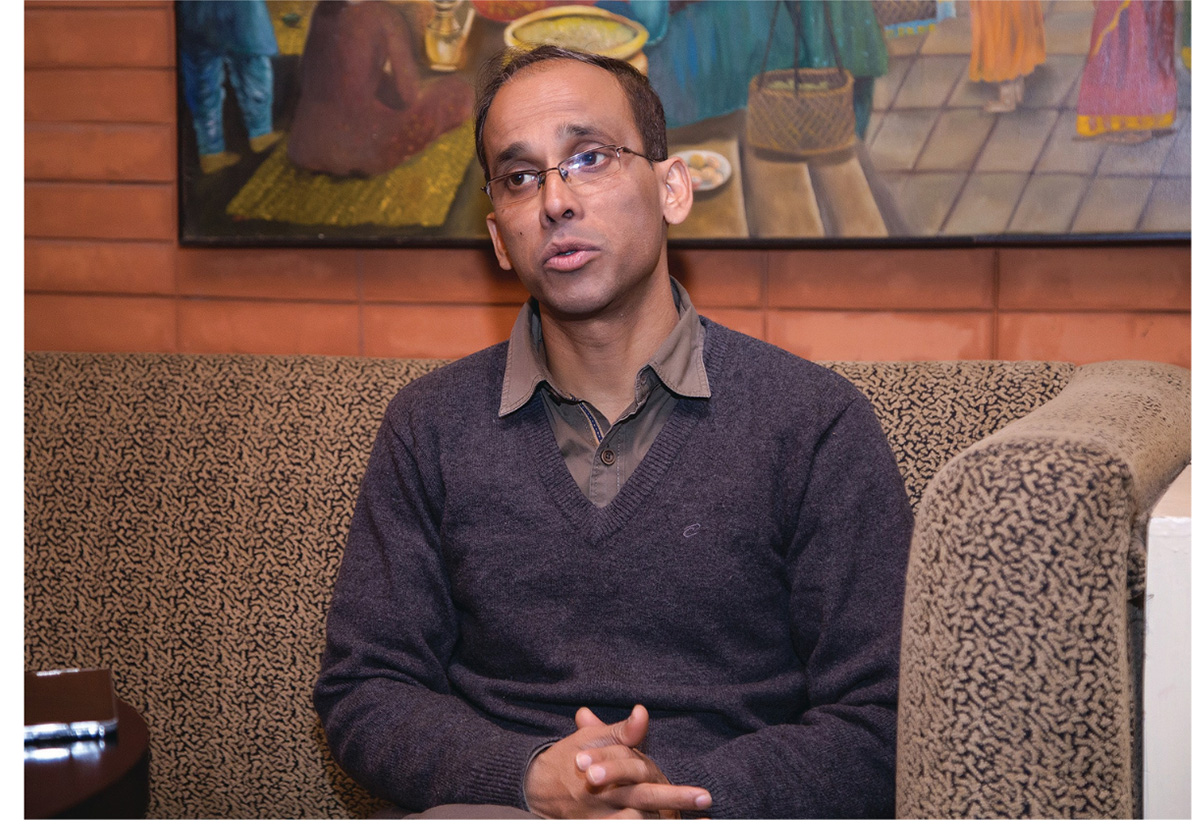
Dr Nihar R Nayak is a Research Fellow at Institute for Defence Studies and Analyses (IDSA). Nayak is an expert in Nepal, Bhutan, left-wing extremism, Maoist conflict, Bhutan and cooperative security in South Asia. He joined IDSA in April 2006. Nayak is an ardent reader, writer and researcher and has completed his PhD in International Politics from Jawaharlal Nehru University. He was Visiting Fellow to PRIO, Oslo in 2007, and did a special course on Peace Research in International Summer School, Oslo University. He has been Visiting Faculty to the Center for the Study of Nepal, Faculty of Social Science, Banaras Hindu University in 2011. He has been Guest Faculty to Lal Bahadur Shastri National Academy of Administration, Mussoorie since September 2006. He has also been involved in a project, ‘Chinese Soft Power Diplomacy in Nepal: A Critical Study,’ and takes special interest in the strategic, political and conflict issues of Nepal. His interest and specialisation has been manifested in the book, ‘Strategic Himalayas: Republican Nepal and External Powers’ that he authored in 2014. He also has contributed many journal publications on issues pertaining to Nepal- ‘China’s Engagement with Nepal in 2014,’ ‘Mutual Assured Security: India-Nepal Security Cooperation to Mitigate Common Threats’, ‘UCPN-Maoist’s Two Line Struggle: A Critical Analysis’, ‘The Madhesi Movement in Nepal: Implications for India,’ ‘Indo-Nepal 1950 Peace and Friendship Treaty: Who is benefiting?,’ ‘PLA Integration into the Nepal Army: Challenges and Prospects’,’Major Powers Involvement in Nepal since the 1990s: Implications for India,’ ‘Maoists in Nepal and India: Tactical Alliances and Ideological Differences’ and ‘The Maoist Movement in Nepal and Its Tactical Digressions: A Study of Strategic Revolutionary Phases, and Future Implications,’ are some of his analytical pieces. During his visit to Nepal to participate in the Infrastructure Summit held recently in Kathmandu, Business 360° caught up with him to discuss various issues relevant to the economy of Nepal, its strategic geographic placement, Asian economy and its future.
Nepal is in a geographically strategic position, yet unable to gain from the aggressive growth of its giant neighbours. Are we just ill prepared or is it something else in your opinion?
The fact is that India and China have some strategic interest from certain reasons like geographic factor, cultural factor and resource factor too. But how Nepal is going to gain the benefit completely depends upon Nepal. Nepal has to take initiative obviously. For the last one decade, this country has been witnessing political liquidity. And without politics being normal or policy being stable, it will be difficult for Nepal to maintain a balanced relationship with both the countries. Yes, strategic interest is there, economy is booming in China and India, but what I am seeing is, one thing is missing, that is political stability in Nepal. There are problems to implement the constitution. First it took 7-8 years to draft the constitution and when the constitution is adopted, there are again struggles to implement it. Governance is missing here, nor does the country has a strong and vibrant economic policy. The absence of strong leadership, strong legal framework and economic vision is thwarting Nepal’s efforts to reap benefit from the development of its neighbours. In fact, everything has to be synchronised with the constitution starting from the local election to economic and foreign policy and strategic issues. For that you need a strong political system. This coalition government is being led by Pushpa Kamal Dahal and after a certain phase he will be replaced by Congress - may be Sher Bahadur Deuba. And I can see there are certain differences between Dahal and Deuba. While there is also another group Rastriya Prajantra Party. So if there is any internal arrangement, Kamal Thapa is also eying to be the Premier. Nobody seems to be serious about Nepal’s interest, about bringing stability and progress. This is entirely an internal issue of Nepal. You can’t expect your neighbours to come, hold your hand and make you do what needs to be done. This is a wrong expectation. Entire political and development issue should be completely domestic, indigenous issue. There should not be any dependency in terms of political issues.
Despite this situation, can there be measures for the country’s economy to grow?
No you can’t expect that. It’s not possible. Unless and until, these issues are solved, there is not any possibility to march towards economic prosperity. Because political issues and economy are all integrated. Political situation alone decides the fate of the economy. Without stable political situation, I don’t see the likelihood of a vibrant economy because decision makers will give direction by creating policy. Private partners function accordingly. But here, the initial part is completely missing. Private sector here is ready to cooperate and ready to invest. But basic things are missing like road connectivity, electricity and other factors that plays immense role in economic development. The private sector needs land, they need environment clearances. And that is not happening. That’s why projects are delayed. So there is the void of political willingness for economic growth.
How do you view the future of this region?
The future of Asia appears to be economically very well. Because European countries and America are still struggling in the wake of 2008 economic crisis, particularly Europe. And America also under Trump’s leadership is in a new transition phase as Trump is trying to do a lot of new things. So it is very complicated situation at present. On the other hand, China is looking to achieve seven percent economic growth which is very healthy. India is also maintaining robust growth. China will be continue to remain the economic power while India will follow suit. While strategic differences between India and China will continue because of other countries like America, Japan among others, they are all using India as their democratic alliance. This adds to suspicion among Chinese leaders. That kind of suspicion and trust deficit will continue for some time. On the other hand, Trump’s leadership is also going to play its part. Sometimes he makes statements that make the entire region vulnerable. Since the fundamental structure for economic growth is quite strong in both the countries, Asia’s economic future is pretty bright. I believe politically and economically, Asians will be leading the world. Though Asia is bound for a bright economic future as you say, it is also struggling with challenges of terrorism, terrorist financing, corruption and irregularities in government mechanisms. Terrorism is not only the concern of Asia but of the whole world. It has now become a global phenomenon. And India and China alone can’t handle it. It needs the coordinated efforts from all countries of the world. Coming to the governance issue, every year if you see the governance assessment report, both India and China are improving gradually. China particularly takes very stern action against corruption. It will take awhile to address corruption issues, terrorist financing and to improve the quality of life. Demonetisation was recently adopted in India. That was a very big step towards particularly reducing corruption and to improve government efficiency and internal mechanism. So efforts are already there. Demonetisation has been the biggest success of Modi’s government. At least, black money has come down and now most transactions are happening electronically. Gradually it will improve.
SAARC Summit did not happen this year, perhaps it is marked for failure. Other groups are now being formulated. How does this affect economics?
India initially was a reluctant actor particularly when SAARC was initiated in the early 80s as it thought it could be a regional ganging against India. But gradually when India realised the importance of SAARC, particularly in the post economic reformation period, India felt that its economy is booming and that it has to share its economic benefits with its neighbours. It also maintained that that the entire SAARC region can and should be a whole single market and it was then that India started engaging with SAARC. From 2003 onwards, India has been very active. One clearly knows that when Prime Minister Modi was in Kathmandu during the last SAARC summit, he tried to sign a few new agreements particularly Motor Vehicle Agreement and SAARC Railway Agreement. But that could not be realised only because of Pakistan. They said that they have some reservations in signing that agreement. So those differences derailed the entire effort to bring SAARC as a single economic platform and to share each other’s prosperity and economic benefits. And then India realised that because of only one member, other members and SAARC should not suffer. So India opted for another kind of sub-regional collaboration like BBIN. Four countries from SAARC are the constituents of BBIN and it has been expanded. Initially it was started as a project of connectivity but has now expanded to cover other issues of mutual cooperation like energy, water resources, SAARC satellite issues and cultural connectivity, among others. I hope in the future all these issues and projects will be successful while BBIN also added members to include Nepal, India, Bhutan, Bangladesh, Maldives, and Sri Lanka and gradually Pakistan will join. We have to expect that positive outcomes will happen in the future and that Pakistan will gradually cooperate. The reason why SAARC has not been that effective is that while all members are of the opinion that bilateral issues should not be discussed in SAARC as it is multi-lateral mechanism, Pakistan repeatedly tries to highlight Jammu and Kashmir issues. This is a major bone of contention. But once terrorism issues are resolved, Pakistan will also join the group. I think SAARC may not be effective as a regional forum but other sub-regional mechanisms like BIMSTEC and BBIN has strong potential.






